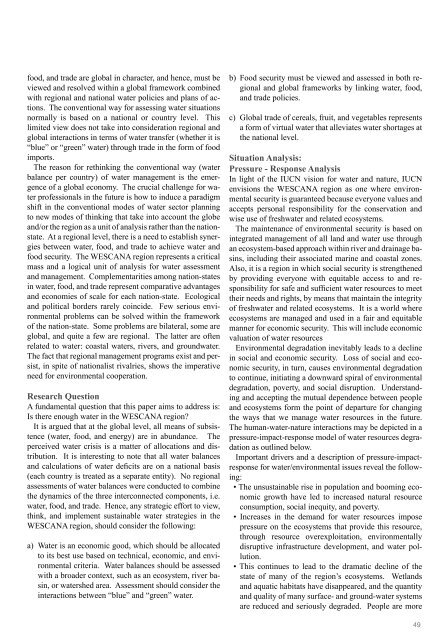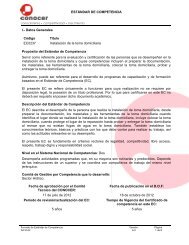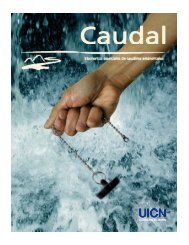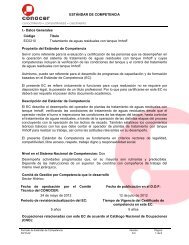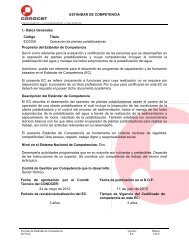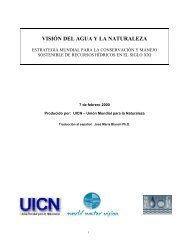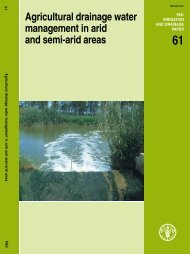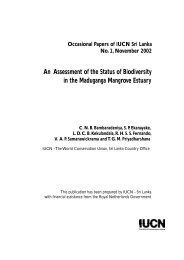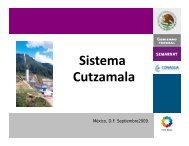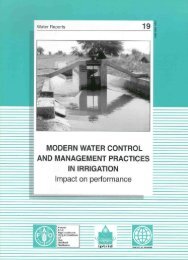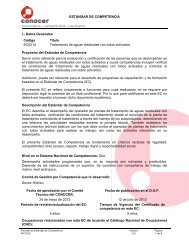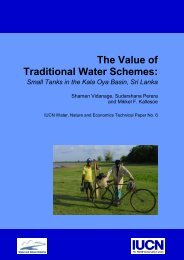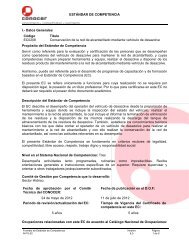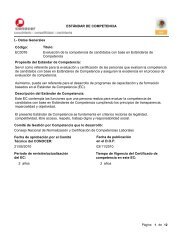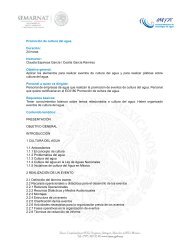The Conservation and Sustainable Use of Freshwater ... - IUCN
The Conservation and Sustainable Use of Freshwater ... - IUCN
The Conservation and Sustainable Use of Freshwater ... - IUCN
Create successful ePaper yourself
Turn your PDF publications into a flip-book with our unique Google optimized e-Paper software.
food, <strong>and</strong> trade are global in character, <strong>and</strong> hence, must be<br />
viewed <strong>and</strong> resolved within a global framework combined<br />
with regional <strong>and</strong> national water policies <strong>and</strong> plans <strong>of</strong> actions.<br />
<strong>The</strong> conventional way for assessing water situations<br />
normally is based on a national or country level. This<br />
limited view does not take into consideration regional <strong>and</strong><br />
global interactions in terms <strong>of</strong> water transfer (whether it is<br />
“blue” or “green” water) through trade in the form <strong>of</strong> food<br />
imports.<br />
<strong>The</strong> reason for rethinking the conventional way (water<br />
balance per country) <strong>of</strong> water management is the emergence<br />
<strong>of</strong> a global economy. <strong>The</strong> crucial challenge for water<br />
pr<strong>of</strong>essionals in the future is how to induce a paradigm<br />
shift in the conventional modes <strong>of</strong> water sector planning<br />
to new modes <strong>of</strong> thinking that take into account the globe<br />
<strong>and</strong>/or the region as a unit <strong>of</strong> analysis rather than the nationstate.<br />
At a regional level, there is a need to establish synergies<br />
between water, food, <strong>and</strong> trade to achieve water <strong>and</strong><br />
food security. <strong>The</strong> WESCANA region represents a critical<br />
mass <strong>and</strong> a logical unit <strong>of</strong> analysis for water assessment<br />
<strong>and</strong> management. Complementarities among nation-states<br />
in water, food, <strong>and</strong> trade represent comparative advantages<br />
<strong>and</strong> economies <strong>of</strong> scale for each nation-state. Ecological<br />
<strong>and</strong> political borders rarely coincide. Few serious environmental<br />
problems can be solved within the framework<br />
<strong>of</strong> the nation-state. Some problems are bilateral, some are<br />
global, <strong>and</strong> quite a few are regional. <strong>The</strong> latter are <strong>of</strong>ten<br />
related to water: coastal waters, rivers, <strong>and</strong> groundwater.<br />
<strong>The</strong> fact that regional management programs exist <strong>and</strong> persist,<br />
in spite <strong>of</strong> nationalist rivalries, shows the imperative<br />
need for environmental cooperation.<br />
Research Question<br />
A fundamental question that this paper aims to address is:<br />
Is there enough water in the WESCANA region?<br />
It is argued that at the global level, all means <strong>of</strong> subsistence<br />
(water, food, <strong>and</strong> energy) are in abundance. <strong>The</strong><br />
perceived water crisis is a matter <strong>of</strong> allocations <strong>and</strong> distribution.<br />
It is interesting to note that all water balances<br />
<strong>and</strong> calculations <strong>of</strong> water deficits are on a national basis<br />
(each country is treated as a separate entity). No regional<br />
assessments <strong>of</strong> water balances were conducted to combine<br />
the dynamics <strong>of</strong> the three interconnected components, i.e.<br />
water, food, <strong>and</strong> trade. Hence, any strategic effort to view,<br />
think, <strong>and</strong> implement sustainable water strategies in the<br />
WESCANA region, should consider the following:<br />
a) Water is an economic good, which should be allocated<br />
to its best use based on technical, economic, <strong>and</strong> environmental<br />
criteria. Water balances should be assessed<br />
with a broader context, such as an ecosystem, river basin,<br />
or watershed area. Assessment should consider the<br />
interactions between “blue” <strong>and</strong> “green” water.<br />
b) Food security must be viewed <strong>and</strong> assessed in both regional<br />
<strong>and</strong> global frameworks by linking water, food,<br />
<strong>and</strong> trade policies.<br />
c) Global trade <strong>of</strong> cereals, fruit, <strong>and</strong> vegetables represents<br />
a form <strong>of</strong> virtual water that alleviates water shortages at<br />
the national level.<br />
Situation Analysis:<br />
Pressure - Response Analysis<br />
In light <strong>of</strong> the <strong>IUCN</strong> vision for water <strong>and</strong> nature, <strong>IUCN</strong><br />
envisions the WESCANA region as one where environmental<br />
security is guaranteed because everyone values <strong>and</strong><br />
accepts personal responsibility for the conservation <strong>and</strong><br />
wise use <strong>of</strong> freshwater <strong>and</strong> related ecosystems.<br />
<strong>The</strong> maintenance <strong>of</strong> environmental security is based on<br />
integrated management <strong>of</strong> all l<strong>and</strong> <strong>and</strong> water use through<br />
an ecosystem-based approach within river <strong>and</strong> drainage basins,<br />
including their associated marine <strong>and</strong> coastal zones.<br />
Also, it is a region in which social security is strengthened<br />
by providing everyone with equitable access to <strong>and</strong> responsibility<br />
for safe <strong>and</strong> sufficient water resources to meet<br />
their needs <strong>and</strong> rights, by means that maintain the integrity<br />
<strong>of</strong> freshwater <strong>and</strong> related ecosystems. It is a world where<br />
ecosystems are managed <strong>and</strong> used in a fair <strong>and</strong> equitable<br />
manner for economic security. This will include economic<br />
valuation <strong>of</strong> water resources<br />
Environmental degradation inevitably leads to a decline<br />
in social <strong>and</strong> economic security. Loss <strong>of</strong> social <strong>and</strong> economic<br />
security, in turn, causes environmental degradation<br />
to continue, initiating a downward spiral <strong>of</strong> environmental<br />
degradation, poverty, <strong>and</strong> social disruption. Underst<strong>and</strong>ing<br />
<strong>and</strong> accepting the mutual dependence between people<br />
<strong>and</strong> ecosystems form the point <strong>of</strong> departure for changing<br />
the ways that we manage water resources in the future.<br />
<strong>The</strong> human-water-nature interactions may be depicted in a<br />
pressure-impact-response model <strong>of</strong> water resources degradation<br />
as outlined below.<br />
Important drivers <strong>and</strong> a description <strong>of</strong> pressure-impactresponse<br />
for water/environmental issues reveal the following:<br />
• <strong>The</strong> unsustainable rise in population <strong>and</strong> booming economic<br />
growth have led to increased natural resource<br />
consumption, social inequity, <strong>and</strong> poverty.<br />
• Increases in the dem<strong>and</strong> for water resources impose<br />
pressure on the ecosystems that provide this resource,<br />
through resource overexploitation, environmentally<br />
disruptive infrastructure development, <strong>and</strong> water pollution.<br />
• This continues to lead to the dramatic decline <strong>of</strong> the<br />
state <strong>of</strong> many <strong>of</strong> the region’s ecosystems. Wetl<strong>and</strong>s<br />
<strong>and</strong> aquatic habitats have disappeared, <strong>and</strong> the quantity<br />
<strong>and</strong> quality <strong>of</strong> many surface- <strong>and</strong> ground-water systems<br />
are reduced <strong>and</strong> seriously degraded. People are more<br />
49


